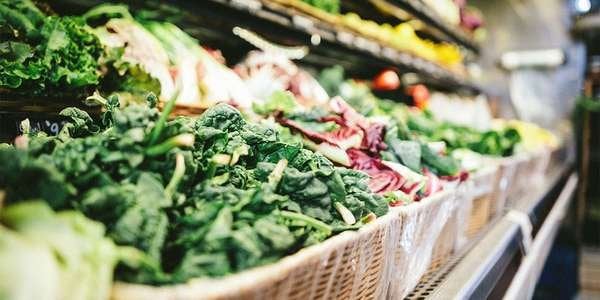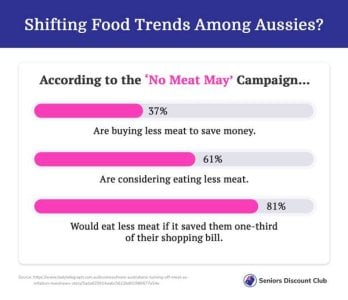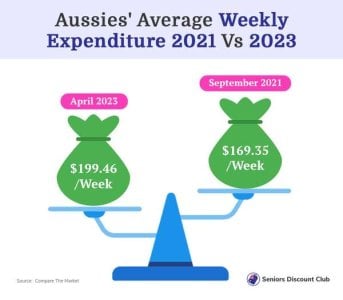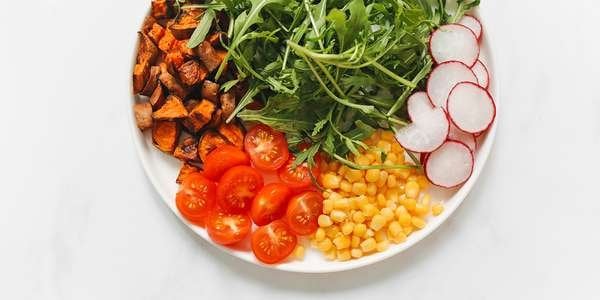Aussies turn to vegetarianism amid soaring grocery prices
- Replies 7
Are grocery prices changing your purchasing habits? For some Australians, a dietary shift towards vegetarianism has become essential as the cost of living continues to skyrocket throughout the country.
Stef Levenska, a mum from Sydney, shared her thoughts online last week upon discovering that Woolworths’ mince is currently priced at $12 per kilo.
‘Is anyone else contemplating going vegetarian in the current cost of living crisis?’, she asked.
‘I was feeling inspired to be a bit thrifty and decided to make my own hamburger patties for dinner, walked down the mince aisle in Woolies, and felt sick inside.’
‘I've never really liked cooking meat, especially chicken, and with the current prices of everything it makes sense (to go vegetarian).’

Levenska’s post prompted a discussion among commenters about how they’re turning off meat in favour of more vegetarian choices.
‘We aren't officially vegetarian but have certainly reduced the number of meals we have with meat in them. Tuna is awesome and good to mix up meals,’ one shared.
‘It's very easy and cheap to be vegetarian if you like Indian, Mexican, Middle Eastern, and Asian food with tofu,’ another person wrote.
‘Beans, lentils, tofu, and textured vegetable protein are way cheaper than meat and so versatile,’ another commenter said.
Research by the ‘No Meat May’ campaign and Perspectus Global has found that 37 per cent of surveyed consumers are buying less meat to save money, 61 per cent are considering eating less meat, and 81 per cent would eat less meat if it would save them one-third off their shopping bill.
Based on a new report by Compare The Market, rising food costs are having a significant impact on the budgets of more than one-third of Australians.
Over 1,000 Aussies surveyed identified groceries as their biggest financial burden at 32 per cent, followed by mortgage repayments at 24 per cent, rent at 15 per cent, and energy costs at 7.7 per cent.
According to the survey, 46 per cent of respondents regularly cut their grocery budget to pay for other expenses.

‘Compared to just two years ago, Aussies are spending $1,565 more on groceries annually which really adds up when we factor in a rise in rent, repeated rate rises for mortgages, as well as high energy bills and insurance renewals,’ Noémi Hadnagy of Compare The Market said.
‘When you add that up, it's enough to fund a weekend getaway, pay for your car's annual registration, cover your internet bills for a year or purchase a new smartphone. It's quite alarming.’
More data showed Aussies spent an average of $199.46 a week in April this year compared to just $169.35 on groceries every week in September 2021.
Due to the elevating prices, an increasing number of Australians are getting more creative in their food choices and shopping lists.
One mum shared a variety of meatless recipes to try, saying: ‘It's super cheap to eat vegetarian and it's definitely not all beans and rice!’
‘You can pick up an eggplant for $1.40 and make yourself a parmi with some breadcrumbs or you can chuck some miso on and roast it.’
‘You can pick up a pack of tofu for $2.50 and make (lettuce wraps). You could do a quiche with some mushrooms and garlic, super cheap.’
Others suggested trying using canned nutmeat as a meat alternative, at $6 for 415g, and getting creative with 'hearty soups'.
With all that in mind, there are also plenty of strategies that can help you save money on grocery shopping.
Tips for Budget-Friendly Grocery Shopping
1. Plan your meals: Before heading to the grocery store, make a meal plan for the week. This will help you determine exactly what ingredients you need and avoid impulsive purchases.
2. Create a shopping list: Based on your meal plan, create a detailed shopping list and stick to it while at the store to avoid buying unnecessary items.
3. Set a budget: Determine how much you can afford to spend on groceries each week and stick to that budget. Keep track of your expenses to stay within your limits.
4. Compare prices: Take the time to compare prices of different brands and products. Generic or store-brand items are often cheaper and can be of similar quality to branded products.
5. Shop in bulk: Buying in bulk can often save you money in the long run. Look for non-perishable items, such as rice, pasta, and canned goods, that you use frequently and purchase in larger quantities.
6. Use coupons and discounts: Look for coupons, discounts, and loyalty programs offered by the grocery store or through mobile apps. These can help you save money on specific items.
7. Shop seasonally and locally: Fruits and vegetables that are in season are usually more affordable and fresher. Consider buying from local farmers' markets for fresh produce at reasonable prices.
8. Don't shop when you’re hungry: Shopping on an empty stomach can lead to impulse purchases and overspending. Eat a meal or snack before heading to the store to make more rational choices.

So, dear SDC members, are you also cutting back on meat in your diet? We would love to hear your thoughts in the comments section below!
Stef Levenska, a mum from Sydney, shared her thoughts online last week upon discovering that Woolworths’ mince is currently priced at $12 per kilo.
‘Is anyone else contemplating going vegetarian in the current cost of living crisis?’, she asked.
‘I was feeling inspired to be a bit thrifty and decided to make my own hamburger patties for dinner, walked down the mince aisle in Woolies, and felt sick inside.’
‘I've never really liked cooking meat, especially chicken, and with the current prices of everything it makes sense (to go vegetarian).’

The cost-of-living crisis is forcing some Aussies to rethink their diets. Image Credit: Shutterstock
Levenska’s post prompted a discussion among commenters about how they’re turning off meat in favour of more vegetarian choices.
‘We aren't officially vegetarian but have certainly reduced the number of meals we have with meat in them. Tuna is awesome and good to mix up meals,’ one shared.
‘It's very easy and cheap to be vegetarian if you like Indian, Mexican, Middle Eastern, and Asian food with tofu,’ another person wrote.
‘Beans, lentils, tofu, and textured vegetable protein are way cheaper than meat and so versatile,’ another commenter said.
Research by the ‘No Meat May’ campaign and Perspectus Global has found that 37 per cent of surveyed consumers are buying less meat to save money, 61 per cent are considering eating less meat, and 81 per cent would eat less meat if it would save them one-third off their shopping bill.
Based on a new report by Compare The Market, rising food costs are having a significant impact on the budgets of more than one-third of Australians.
Over 1,000 Aussies surveyed identified groceries as their biggest financial burden at 32 per cent, followed by mortgage repayments at 24 per cent, rent at 15 per cent, and energy costs at 7.7 per cent.
According to the survey, 46 per cent of respondents regularly cut their grocery budget to pay for other expenses.

Vegetables might soon be having their time in the consumer limelight as a healthy and budget-friendly food option. Image Credit: Unsplash
‘Compared to just two years ago, Aussies are spending $1,565 more on groceries annually which really adds up when we factor in a rise in rent, repeated rate rises for mortgages, as well as high energy bills and insurance renewals,’ Noémi Hadnagy of Compare The Market said.
‘When you add that up, it's enough to fund a weekend getaway, pay for your car's annual registration, cover your internet bills for a year or purchase a new smartphone. It's quite alarming.’
More data showed Aussies spent an average of $199.46 a week in April this year compared to just $169.35 on groceries every week in September 2021.
Due to the elevating prices, an increasing number of Australians are getting more creative in their food choices and shopping lists.
One mum shared a variety of meatless recipes to try, saying: ‘It's super cheap to eat vegetarian and it's definitely not all beans and rice!’
‘You can pick up an eggplant for $1.40 and make yourself a parmi with some breadcrumbs or you can chuck some miso on and roast it.’
‘You can pick up a pack of tofu for $2.50 and make (lettuce wraps). You could do a quiche with some mushrooms and garlic, super cheap.’
Others suggested trying using canned nutmeat as a meat alternative, at $6 for 415g, and getting creative with 'hearty soups'.
With all that in mind, there are also plenty of strategies that can help you save money on grocery shopping.
Tips for Budget-Friendly Grocery Shopping
1. Plan your meals: Before heading to the grocery store, make a meal plan for the week. This will help you determine exactly what ingredients you need and avoid impulsive purchases.
2. Create a shopping list: Based on your meal plan, create a detailed shopping list and stick to it while at the store to avoid buying unnecessary items.
3. Set a budget: Determine how much you can afford to spend on groceries each week and stick to that budget. Keep track of your expenses to stay within your limits.
4. Compare prices: Take the time to compare prices of different brands and products. Generic or store-brand items are often cheaper and can be of similar quality to branded products.
5. Shop in bulk: Buying in bulk can often save you money in the long run. Look for non-perishable items, such as rice, pasta, and canned goods, that you use frequently and purchase in larger quantities.
6. Use coupons and discounts: Look for coupons, discounts, and loyalty programs offered by the grocery store or through mobile apps. These can help you save money on specific items.
7. Shop seasonally and locally: Fruits and vegetables that are in season are usually more affordable and fresher. Consider buying from local farmers' markets for fresh produce at reasonable prices.
8. Don't shop when you’re hungry: Shopping on an empty stomach can lead to impulse purchases and overspending. Eat a meal or snack before heading to the store to make more rational choices.
Key Takeaways
- Australians are going vegetarian as grocery bills skyrocket during the current cost of living crisis.
- Sydney mum Stef Levenska asked for advice on how to make affordable meals amid sharply rising meat prices, leading to numerous suggestions for vegetarian alternatives.
- A survey by Compare The Market found more than a third of Aussies consider growing grocery bills their biggest financial burden, and nearly half limit groceries to afford other bills.
- Some ways to save money on weekly groceries include planning purchases, setting a budget, and using discounts and coupons.
So, dear SDC members, are you also cutting back on meat in your diet? We would love to hear your thoughts in the comments section below!










